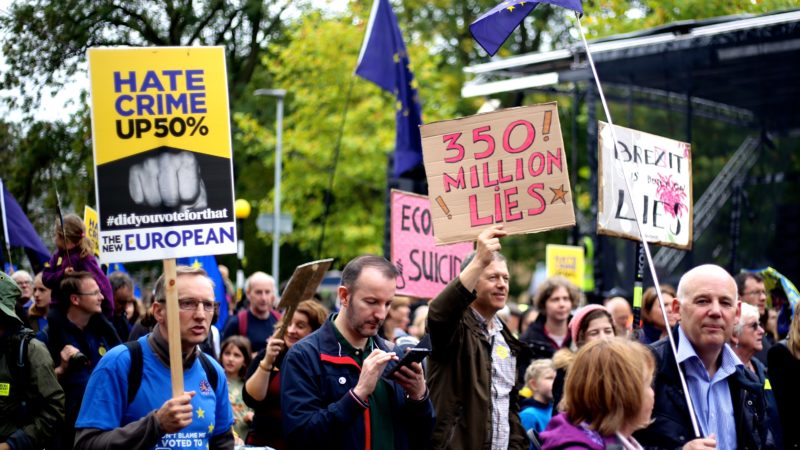Singing Remain’s praises to get a People’s Vote will only divide our country further.

Though many attendees of Saturday’s ‘Put it to the People’ march claimed a second vote would bring unity to a divided country, the justifications for a People’s Vote written on their placards were not unified at all.
On the one hand, you had signs arguing for a second vote on democratic grounds: “Back to the people”, “The people cannot betray the people – we want a final say,” and “Could we just double check? (please)”.
And on the other hand, you had people arguing for a People’s Vote based on the absurdity of Brexit itself, and the need to find a route to remaining in the EU: “Please stop Brexit”, “Bollocks to Brexit,” and “52% pride and prejudice, 48% sense and sensibility”.
Despite a huge variety of arguments on show, these justifications could be loosely clumped together into two categories – democratic arguments for a People’s Vote and political arguments for a People’s Vote. That is, arguments focused on the process of going to back to the people, and those interested in the outcome of that process.
Of course, to complicate things, many people include both in their calls for a second referendum.
As well as the meshing of different placards at Saturday’s march, the soaring popularity of the Revoke Article 50 petition over the weekend has also made it seem as if those making democratic arguments for a People’s Vote and those plain and simply wanting to stop Brexit are part of the same political movement.
But we need to be very careful about blurring these lines. Only the democratic case for a People’s Vote carries credibility and has the potential to reunite our divided country. Trying to secure a second referendum on the basis that Remain is objectively the best option returns to the mistakes of the original 2016 vote, assuming there are rational right answers and that those in favour of Brexit need time to see the light.
This is a deeply harmful strategy. It assumes that those who voted to Leave were ignorant: not in possession of the knowledge that would inevitably lead them to conclude that exiting the EU would be a disaster.
This is a problem firstly because such arguments create the feeling that the educated and all-knowing are reasserting their superiority, telling the rest of the population to “think again, and get it right this time”. How are signs like “52% pride and prejudice, 48% sense and sensibility” going to unite the country around a People’s Vote when its arrogant tone is precisely what people voted against in 2016?
The second, broader problem with arguing that Remain is objectively the best option is that there are very rarely any objective truths in politics whatsoever – let alone in this one EU debate.
It might well be true that Remain is objectively the best outcome on an economic basis. But politics is not the same thing as economics. People voted to Leave in 2016 because they wanted national sovereignty and control of their borders, among other things. There is no scientific way to prove that economic success is more important than national sovereignty.
Democratic arguments for a People’s Vote avoid these problems. They are based on the idea that everybody who voted in that 2016 referendum, whether for Leave or Remain, could not possibly have been in full possession of the facts about what kind of Brexit we would be pursuing. Equality is at the heart of the argument: each and every individual should be free to re-examine the situation three years on, given that each and every one of them was equally in the dark in 2016.
All of this is not at all to say that the increasing economic evidence about the impact of leaving the EU is not important. It is vital in shining a brighter light on Brexit so people can make up their own minds in a second vote – with Remain on the table. The problem is when the economic figures are presented as expert knowledge that should settle rather than spark debate.
While it is inevitable that a march of many hundreds of thousands will include signs and slogans of a wide variety, we need to be much clearer about why we want a People’s Vote. Instead of returning to the division of 2016 by emphasising the merits of Remain, we need a democratic case for a second referendum that unites us and gives everyone the chance to have a final say on Brexit.
Sam Dalton is a progressive activist working in policy and public affairs. Follow him on Twitter.
To reach hundreds of thousands of new readers and to make the biggest impact we can in the next general election, we need to grow our donor base substantially.
That's why in 2024, we are seeking to generate 150 additional regular donors to support Left Foot Forward's work.
We still need another 124 people to donate to hit the target. You can help. Donate today.




12 Responses to “The valid case for a People’s Vote is democratic not political”
Frankie D.
@nhsgp
“What about a third referendum, best of 3 if needed?” This would be the third referendum.
Frankie D.
@nhsgp
“A vote for mays deal or to remain means austerity.” You’ve misspelt leave there. Voting to leave and utterly fuck over our economy is voting for more austerity than you’ve ever seen before.
Frankie D.
@nhsgp
How much “control of your money” did you have when the value of the pound tanked?
Patrick Newman
Indeed, Frankie. The first referendum produced a 2 to 1 majority for staying. I await with irrepressible excitement the million-strong pro-Leave march this Saturday. I am confident that the current leave petition will find what must be the missing 5 million to make it match the Revoke Article 50 petition!
nshgp
“Never underestimate the power of stupid people in large groups.”
It’s called Westminster.